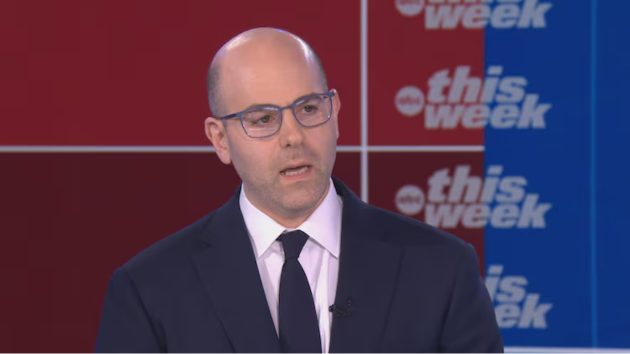
Chair of the White House Council of Economic Advisers Stephen Miran said that some countries that are negotiating with the United States in good faith could see tariffs delayed as President Donald Trump’s deadline to strike trade deals closes in.
Speaking with ABC News’ “This Week” anchor George Stephanopoulos, Miran hedged on what deals are in the works.
“On tariffs, the president’s deadline is approaching for the deals. You’ve only seen three deals so far. What should we expect next?” Stephanopoulos asked.
“I’m still optimistic that we’re going to get a number of deals later this week. Part of that is because all the negotiating goes through a series of steps that lead to a culmination timed with the deadline,” Miran said.
Pressed on if these other deals fail to come through and if Trump would extend the deadline, Miran indicated that could be possible.
“Well, my expectation would be that countries that are negotiating in good faith and making the concessions that they need to get to a deal, but the deal is just not there yet because it needs more time, my expectation will be that those countries get a roll, you know, sort of get the date rolled,” he said.
Asked which countries could see that date shifted, Miran refused to elaborate, but said that he has heard good things about talks with Europe and India.
“I would expect that a number of countries that are in the process of making those concessions, you know, they might see their date rolled. For the countries that aren’t making concessions, for the countries that aren’t negotiating in good faith, I would expect them to sort of see higher tariffs,” Miran said. “But again, the president will decide later this week and in the time following whether or not the countries are doing what it takes to get access to the American market like they’ve grown accustomed to.”
Stephanopolous was also joined by former Treasury Secretary Larry Summers, who balked at the potential economic benefits of Trump’s tariffs.
“It probably will collect some revenue at the cost of higher inflation for American consumers, less competitiveness for American producers,” Summers said. “So higher prices, less competitiveness, and not really that much revenue relative to what’s being given to the very wealthy in this [budget] bill.”
Here are more highlights from Miran and Summers’ interviews:
Miran on CBO estimates for Trump’s megabill
Stephanopoulos: Why should we not believe the CBO when they say that something approaching a little more than 11 million people are going to be — are going to lose their health care coverage because of the Medicaid cuts?
Miran: Well, because they’ve been wrong in the past. When Republicans repealed the individual mandate penalty during the Tax Cuts and Jobs Act in the president’s first term, CBO predicted that there was going to be about 5 million people losing their insurance by 2019. And you know what? The number was not very significantly changed at all. It was a tiny fraction of that. And so, they’ve been wrong in the past. And look, if we don’t pass the — if we didn’t pass the bill, 8 to 9 million people would’ve lost their insurance for sure, as a result of the biggest tax act in history creating a huge recession. The best way to make sure people are insured is to grow the economy, get them jobs, get them working, get them insurance through their employer. Creating jobs, creating a booming economy is always the best way to get people insured.
Miran on past tax cuts
Stephanopoulos: You say this is all going to turbocharge growth. We have seen some experience with this back — in Ronald Reagan’s day, back in 1981. He had huge tax cuts. The growth didn’t come, and they had to end up raising taxes for several years after that. Concerned that could happen again?
Miran: Well, like I said before, you know, history’s on our side. If you look at what happened in the president’s first term, growth soared and there was no real material, you know, meaningful long-term decline in revenue. Revenue as a share of GDP was 17.1% last year, the same as it was before the Tax Cuts and Jobs Act. So, you got this huge surge in growth as a result of the Tax Cuts and Jobs Act. There was no material long-term decline in revenue. Corporate revenue even went up as a share of GDP from 1.6 to 1.9%. And the growth delivered. And we expect the same thing to happen this time.
Summers on cuts to the safety net
Stephanopoulos: In The New York Times this week, you and Robert Rubin, who also served as president, as Treasury secretary, called this bill “dangerous,” said it “posed a huge risk to the economy.” What are those risks?
Summers: George, just to start with, what your people have been describing is the biggest cut in the American safety net in history. The Yale Budget Lab estimates that it will kill, over 10 years, 100,000 people. That is 2,000 days of death like we’ve seen in Texas this weekend. In my 70 years, I’ve never been as embarrassed for my country on July Fourth. These higher interest rates, these cutbacks in subsidies to electricity, these reductions in the availability of housing, the fact that hospitals are going to have to take care of these people and pass on the costs to everybody else, and that’s going to mean more inflation, more risk that the Fed has to raise interest rates and run the risk of recession, more stagflation, that’s the risk facing every middle-class family in our country because of this bill. And for what? A million dollars over 10 years to the top tenth of a percent of our population. Is that the highest priority use of federal money right now? I don’t think so. This is a shameful act by our Congress and by our president that is going to set our country back.
Summers on claims of economic growth
Stephanopoulos: Part of the president’s argument is that economic growth sparked by the bill will alleviate the dangers that you talk about here. The chair of the Council of Economic Advisers is up next and his council issued a report this week projecting $11 trillion in deficit reduction from growth, higher tax revenue and savings on debt payments. How do you respond to that?
Summers: It is, respectfully, nonsense. None of us can forecast what’s going to happen to economic growth. What we can forecast is that when people have to hold government debt instead of being able to invest it in new capital goods, new machinery, new buildings, that makes the economy less productive. What we can forecast is that when we’re investing less in research and development, investing less in our schools, that there is a negative impact on economic growth. There is no economist anywhere, without a strong political agenda, who is saying that this bill is a positive for the economy. And the overwhelming view is that it is probably going to make the economy worse. Think about it this way. How long can the world’s greatest debtor remain the world’s greatest power? And this is piling more debt onto the economy than any piece of tax legislation in dollar terms that we have ever had.
Copyright © 2025, ABC Audio. All rights reserved.




